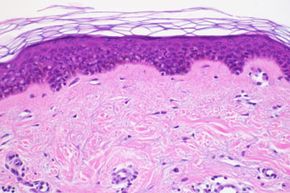Between deciding which moisturizer to use, what level of sun protection factor (SPF) you need for the beach, or which makeup will best prevent breakouts, it may feel as if your skin is a constant concern. And since it's your largest organ, it probably should receive the right amount of attention. Taking good care of your skin is important for your overall health and well-being, as it provides a protective shield against external factors that can cause harm. You know that you need to take care of your skin, but what exactly are you protecting? What is your skin made of?
Skin has many components, including water, lipids, proteins, minerals and chemicals. Your skin has basic three layers: the epidermis, the dermis and the subcutaneous fat layer, or hypodermis [source: WebMD].
Advertisement
The epidermis is the outer layer of skin, comprised of translucent cells that produce keratin, a protein that protects you from potentially detrimental factors in the environment. This is the layer of skin that you can actually see and touch. The epidermis is also home to cells that produce melanin, which is the substance that gives skin its color. Overall, your epidermis controls the appearance of your skin and helps to you to retain water [source: Ohio State University Medical Center].
The dermis is the middle layer of skin, which contains two important proteins that contribute to the skin's strength and texture: elastin and collagen. These two proteins keep your skin from wrinkling and sagging, but they break down with age, which is why you may recognize them from anti-aging product advertisements. The dermis also contains nerves, blood vessels, hair follicles and sweat glands. When you feel pain after you cut yourself, it's because of the nerves and receptors in the dermis.
Finally, there's the subcutaneous layer, made up of fat and collagen cells. This layer helps you retain heat, and it also absorbs shock and protects your internal organs from injury. If tissue in this layer begins to deteriorate, your skin may start to sag.
The skin is a complex and vital organ that serves many purposes. To learn more about your skin, see the links on the next page.
Advertisement


